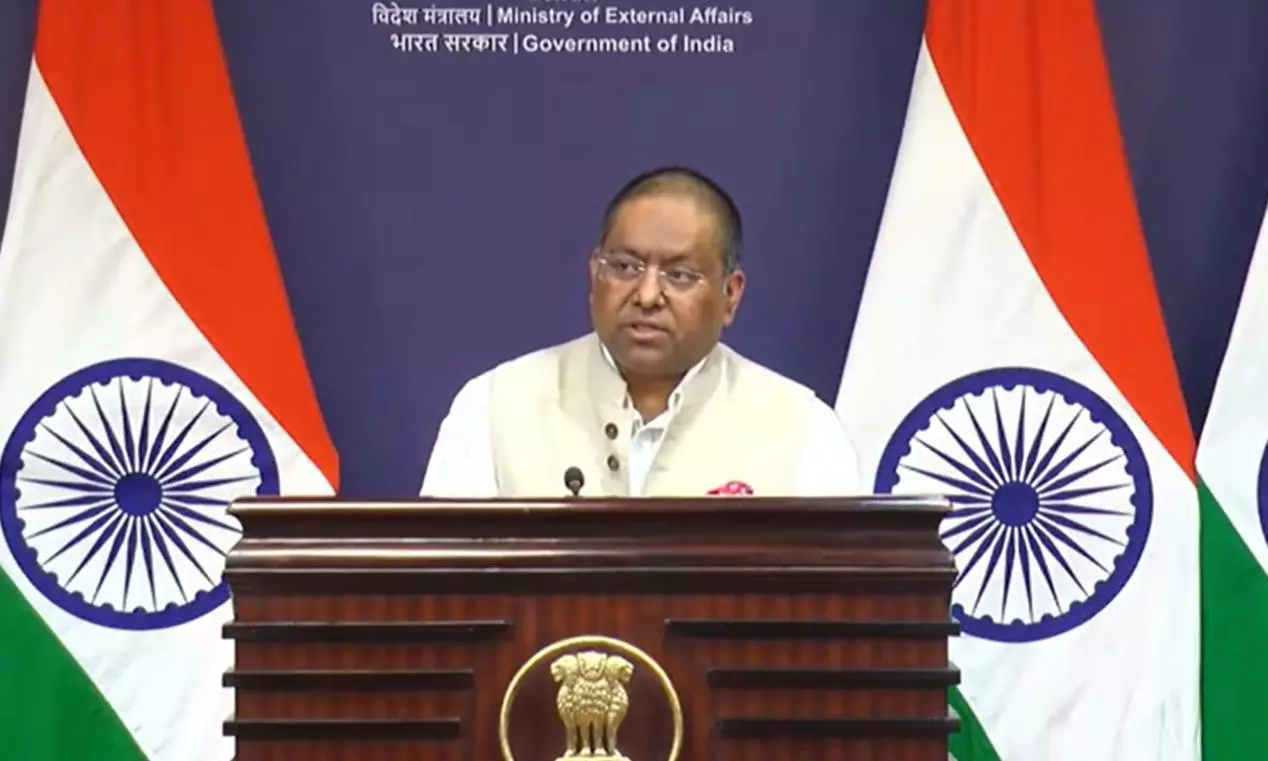
‘Indus treaty in abeyance until…’: 10 points from MEA weekly briefing
MEA says issue of trade has not come up in any discussion between India and US leaders, India is pursuing listing of TRF as terrorist entity with UNSC

India on Tuesday (May 13) reiterated its long-standing position that Kashmir is a bilateral issue between New Delhi and Islamabad and asserted that there has been no change in this policy. India also said it will keep the Indus Waters Treaty in abeyance until Pakistan “credibly and irrevocably abjures its support for cross-border terrorism”.
In his weekly media briefing, Randhir Jaiswal, the official spokesperson of the Ministry of External Affairs, also asserted that the issue of trade has not come up in any discussion between India and US leaders.
Here are some of the major points made by Jaiswal:
1. "We have a longstanding position that any issue involving Jammu and Kashmir has to be addressed by India and Pakistan bilaterally. That stated policy has not changed. The outstanding matter is the vacation of illegally occupied Indian territory by Pakistan." (The assertion came against the backdrop of US President Donald Trump's renewed offer to mediate on the Kashmir issue.)
Also read: ‘Lakshman rekha’ for Pak very clear, will give befitting reply to terror attack: PM Modi
2. "The specific date, time, and wording of the understanding (or ceasefire) was worked out between the DGMOs of the two countries during their phone call on May 10…. The request for this call was received by MEA from the Pakistani high commission at 12.37 hours… Early on May 10, we had mounted an extremely effective attack on key Pakistani Air Force spaces. That was the reason they were now willing to stop firing and military action. Let me be clear: It was the force of the Indian arms that compelled Pakistan to stop firing."
3. "As regards conversations with other nations, the message from India was clear and consistent: India was responding to the April 22 terrorist attack by targeting the terrorist infrastructure. However, if the Pakistani armed forces fire, Indian armed forces will fire back. If Pakistan stops, India will also stop. This was also the message conveyed to the Pakistani side at the time of the commencement of Operation Sindoor, which they did not heed at that time. It is natural that many foreign leaders who heard this from us would have shared it with their Pakistani interlocutors."
Also read: As the guns fall silent, it’s time to ask some questions: A Left MP writes
4. "The Indus Waters Treaty was concluded in the spirit of goodwill and friendship. However, Pakistan has held these principles in abeyance by its promotion of cross-border terrorism for several decades now. India will keep this treaty in abeyance until Pakistan credibly and irrevocably abjures its support for cross-border terrorism. Climate change, demographic shifts, and technological changes have created new realities on the ground as well."
5. "From the time Operation Sindoor commenced on May 7 till the understanding on cessation of firing and military action, there were conversations between Indian and US leaders on the evolving military situation. The issue of trade did not come up in any of these discussions."
6. "A nation that has nurtured terrorism on an industrial scale should think that it can escape the consequences is fooling itself. The terrorist infrastructure sites that India destroyed were responsible not only for the deaths of Indians but of many other innocents around the world. There is now a new normal. The sooner Pakistan gets it, better it is."
Also read: After Op Sindoor, Modi has many questions to answer to Indians
7. "We have been pursuing the listing of TRF (as a terrorist entity) by the UN Security Council 1267 sanctions committee. Over the last two years, we have been sharing information with the monitoring team of the sanctions committee as to why the TRF, the front for the Lashkar-e-Taiba, should be listed as a terrorist entity. We will be sharing more details in this regard in a few days’ time."
8. "Till the night of May 9, Pakistan was threatening India with a massive assault. Once their attempt failed on May 10 morning and they received a devastating Indian counter-response, their tone changed and their DGMO eventually reached out to us."
9. "India has a firm stand that it will never give in to nuclear blackmail or allow cross-border terrorism to be conducted invoking it. In conversations with various countries, we have cautioned them that subscribing to such scenarios would hurt them in their own region." (On speculation of a nuclear war by Trump.)
Also read: India, Pak DGMOs talks focus on avoiding 'inimical' action, reducing troops at borders
10. "The ban on Awami League in Bangladesh without due process is a concerning development. As a democracy, India is concerned at curtailment of democratic freedoms and shrinking political space. We strongly support the early holding of free, fair and inclusive elections in Bangladesh."

